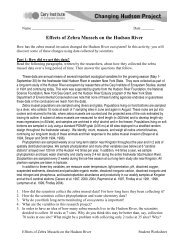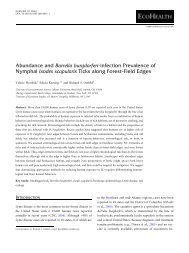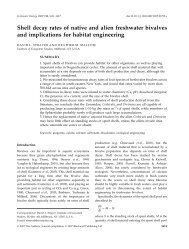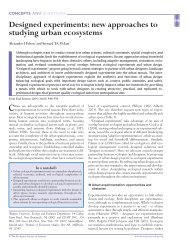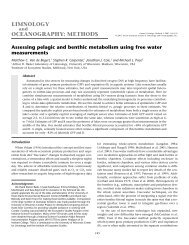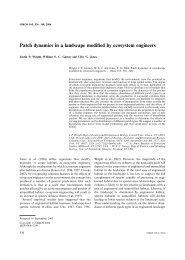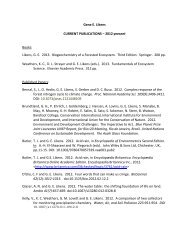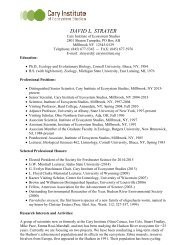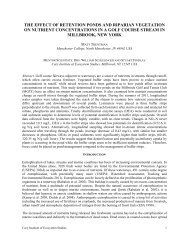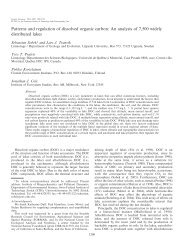Marie F. Smith, CRA;Valerie T. Eviner, PhD - Cary Institute of ...
Marie F. Smith, CRA;Valerie T. Eviner, PhD - Cary Institute of ...
Marie F. Smith, CRA;Valerie T. Eviner, PhD - Cary Institute of ...
Create successful ePaper yourself
Turn your PDF publications into a flip-book with our unique Google optimized e-Paper software.
Introduction<br />
Scientific research is increasingly being<br />
conducted in the public spotlight and the<br />
public is <strong>of</strong>ten frustrated by conflicting scientific<br />
results. The confusing stream <strong>of</strong><br />
information surrounding a research topic<br />
<strong>of</strong>ten provides an example <strong>of</strong> science working<br />
properly since the accumulation <strong>of</strong> new<br />
data <strong>of</strong>ten leads to a new interpretation <strong>of</strong><br />
existing results. Other times, new methods<br />
and data display earlier honest mistakes in<br />
the scientific approach taken to address an<br />
issue. But reversals in scientific knowledge<br />
due to deliberately misleading data are very<br />
damaging to the image <strong>of</strong> science. The public<br />
finds these types <strong>of</strong> reversals disquieting<br />
and begins questioning the expenditure <strong>of</strong><br />
tax dollars on research. Furthermore, misconduct<br />
in any field <strong>of</strong> study can taint public<br />
trust <strong>of</strong> scientific research and delay<br />
implementation <strong>of</strong> policy on critical issues<br />
such as preventing the release <strong>of</strong> toxins into<br />
the environment or mitigation <strong>of</strong> global climate<br />
change.<br />
Behavioral misconduct toward colleagues<br />
also impedes the progression <strong>of</strong> science<br />
and the participation <strong>of</strong> people from<br />
traditionally underrepresented groups.<br />
Many scientists are discouraged or quit<br />
because they encounter undue hostility<br />
towards novel ideas, exploitation <strong>of</strong> subordinates,<br />
co-option <strong>of</strong> other’s ideas, or alienation<br />
<strong>of</strong> people in differing lifestyle, gender,<br />
race or cultural identity. The “relaxed”<br />
nature <strong>of</strong> the scientific enterprise <strong>of</strong>ten facilitates<br />
misconduct.<br />
Responsible research has been defined<br />
(Steneck and Zinn 2003) as research built<br />
on commitment to important values, which<br />
include honesty, accuracy, efficiency, and<br />
objectivity. These values define the meaning<br />
<strong>of</strong> integrity in research. Responsible conduct<br />
should be a determinant in how<br />
research is performed and the practices that<br />
are followed. In order to infuse the research<br />
and education process with ethical, responsible<br />
behavior, both individuals and communities<br />
must explore and identify their<br />
own ethical values.<br />
Federal agencies and institutions share<br />
the responsibility for the research process<br />
and provide guidelines on responsible conduct<br />
through laws, institutional practices,<br />
non-binding codes and guidelines <strong>of</strong> pr<strong>of</strong>essional<br />
organizations. However, the enforcement<br />
<strong>of</strong> expectations for responsible conduct<br />
ultimately relies on individual<br />
researchers and the community dynamics<br />
they create. For example, research mentors<br />
impart their perspectives and values to their<br />
mentees through interactions in their laboratory<br />
groups—behavior that may never be<br />
consciously examined but that may play a<br />
large role in the development <strong>of</strong> interactions<br />
among mentees. Because <strong>of</strong> this, federal<br />
agencies are strongly advocating that individual<br />
institutions be responsible for educating<br />
their employees on what constitutes<br />
responsible conduct and strongly encourage<br />
researchers, both seasoned and new, to participate<br />
in these programs. One <strong>of</strong> the first<br />
topics <strong>of</strong> discussion at IES focused on mentoring<br />
relationships, and later discussions<br />
touched on how mentoring relationships<br />
can either positively or negatively impact<br />
young scientists and their careers. The case<br />
studies were designed to foster discussions<br />
on positive and negative mentoring practices,<br />
how individuals behave in power situations,<br />
and the impact <strong>of</strong> these practices and<br />
behaviors.<br />
IES Approach<br />
to Ethics Education<br />
Institutions bear the responsibility <strong>of</strong><br />
providing education that raises the awareness<br />
<strong>of</strong> both neophyte and seasoned<br />
researchers to recognize behaviors that can<br />
negatively impact collaborations, on any and<br />
every level, and suggest ways <strong>of</strong> overcoming<br />
and dealing with these behaviors. Providing<br />
education on Responsible Conduct in<br />
Research (RCR) has been a challenge for<br />
some institutions because <strong>of</strong> limited<br />
resources, limited funds, and staff availability.<br />
This important topic needs to be presented<br />
in a manner that will capture the<br />
attention <strong>of</strong> the research staff, serve as a catalyst<br />
for bringing to light unproductive<br />
undercurrents, and facilitate productive discussions<br />
that will uncover and begin to<br />
resolve conflicts. Regardless <strong>of</strong> the size <strong>of</strong><br />
22 Volume XXXVI, Issue I, 2005 The Journal <strong>of</strong> Research Administration / Case Study



